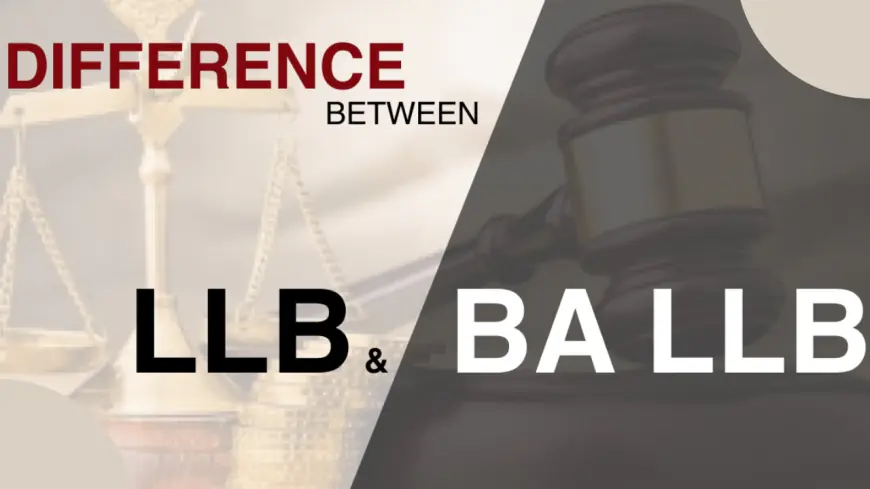BA LLB vs. LLB: Choosing the Right Path in 2024
Explore the choices between BA LLB and LLB in 2024, offering insights into the interdisciplinary and specialized paths for aspiring legal professionals. Make an informed decision for your legal career.

In the dynamic legal landscape of 2024, students aspiring to join the legal profession face an important decision: whether to pursue a Bachelor of Arts and Bachelor of Laws (BA LLB) or a traditional Bachelor of Laws (LLB) program. Each of these programs offers a unique approach to legal education, and the choice you make can have a significant impact on your future legal career. In this article, we will explore the differences between BA LLB and LLB, helping you make an informed decision in the context of 2024.
BA LLB: Blending the Arts and Law
The Bachelor of Arts and Bachelor of Laws (BA LLB) program is designed to provide students with a comprehensive education that combines legal studies with a broader understanding of the liberal arts. This integrated approach offers several advantages for students who wish to develop a well-rounded perspective in their legal careers.
1. Interdisciplinary Learning: One of the key strengths of the BA LLB program is its interdisciplinary nature. Students study law alongside subjects from the arts and humanities, including sociology, political science, economics, and history. This broad exposure fosters critical thinking and helps students connect the legal principles they learn to real-world scenarios.
2. Communication Skills: BA LLB students tend to develop strong communication skills, both written and verbal, due to the diverse nature of their coursework. This is valuable for legal professionals who need to effectively communicate complex legal concepts to clients, colleagues, and in court.
3. Holistic Approach: BA LLB programs often emphasize a holistic approach to legal education, encouraging students to consider the ethical, social, and cultural dimensions of law. This can be particularly beneficial for those interested in fields like human rights, environmental law, or international law.
4. Career Flexibility: Graduates of BA LLB programs have the option to pursue a wide range of career paths, not limited to traditional legal practice. They can work in policy analysis, government, academia, and more, making this a versatile degree.
LLB: The Traditional Legal Path
The Bachelor of Laws (LLB) program provides a more focused and in-depth legal education. It is often considered the traditional path to becoming a lawyer. In 2024, LLB programs continue to be popular for students who are singularly focused on a legal career.
1. Specialized Legal Education: LLB programs are known for their specialized legal curriculum, which covers fundamental legal principles and practices extensively. Students gain a deep understanding of legal systems, procedures, and principles.
2. Legal Practice Focus: LLB graduates are well-prepared for the practice of law, including becoming attorneys, solicitors, or advocates. The curriculum often includes moot courts, legal research, and internships, providing practical experience.
3. Bar Examination: In many jurisdictions, LLB graduates are on the path to taking the bar examination, which is a requirement to practice law. An LLB program often aligns more closely with the specific legal content covered in bar exams.
4. Career as a Lawyer: If your primary goal is to become a lawyer, then an LLB program is the traditional and direct path to achieving that goal. The program is tailored to prepare you for the legal profession.
Choosing Between BA LLB and LLB
The choice between pursuing a BA LLB and an LLB in 2024 depends on your career aspirations, interests, and goals. Here are some factors to consider:
1. Career Goals: If you are committed to becoming a lawyer and practicing law in a specific jurisdiction, an LLB program is likely the better choice, as it is tailored to the legal profession.
2. Interests: Consider your interests and the type of legal career you wish to pursue. If you are drawn to broader legal and social issues, a BA LLB program may provide a more well-rounded education.
3. Future Flexibility: If you are uncertain about your career path or if you have interests beyond traditional legal practice, a BA LLB program offers a more flexible and interdisciplinary education.
4. Jurisdiction: Research the requirements for legal practice in your desired jurisdiction. Some regions prefer graduates from LLB programs, while others may accept graduates from BA LLB programs with additional qualifications or examinations.
5. Personal Growth: Think about your own growth and development. The BA LLB program may encourage critical thinking and communication skills in addition to legal knowledge, which can be valuable in many professions.
Conclusion
In 2024, the decision to pursue a BA LLB or an LLB is a significant one, with each program offering distinct advantages and aligning with different career paths. Your choice should be guided by your career aspirations, interests, and the type of legal practice you envision. Conduct thorough research, consult with academic advisors, and consider the specific requirements of your desired legal jurisdiction. Whether you choose the interdisciplinary approach of the BA LLB program or the specialized focus of the LLB program, your decision should reflect your passion for the law and your commitment to your future legal career.









































